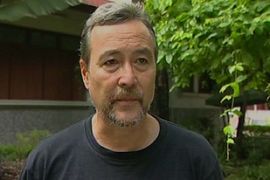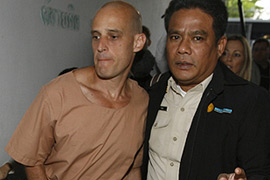Activist charged with Thai ‘insult’
Government critic says controversial ‘lese majeste’ laws used to crush free speech.

“In Western democracy, they have a monarchy, full accountability and transparency is allowed. Therefore, one custom, one bill was the purpose of the lese majeste law,” Ungpakorn told reporters outside the central Bangkok police station on Tuesday.
“The laws are there to protect the military and to protect governments that come to power through military action. They’re not really about protecting the monarchy.”
Evidence
|
“The growing number of arrests and conviction confirm our fear of a dangerous politicisation of lese majeste … used to silence people” Reporters Without Borders in a statement |
Thai police said they have enough evidence to send the political analyst to court.
“He is charged for lese majeste. Just only one charge,” Pathumwan Police Station Chief Police Colonel Paisal Luesomboon, said.
“The evidence is his book ‘The Coup for The Rich’ that sold at Chulalongkorn University bookstore which someone read and reported to us.”
The books were later withdrawn from the bookstore shelf.
Insulting the monarchy is an extremely serious offence under Thai law which stipulates up to 15 years in jail for “whoever defames, insults or threatens the king, the queen, the heir to the throne or the regent”.
Last year a Swiss man, apparently in a drunken frenzy, was found guilty and sentenced to 10 years in jail for defacing images of King Bhumibol Adulyadej, the world’s longest-serving monarch.
The king pardoned him one month later.
Free speech
But rights activists say Thailand’s lese majeste laws, designed to protect the royal family, are outdated and stifle free speech.
 |
| Australian Harry Nicolaides was jailed for three years for insulting the monarchy [Reuters] |
Commenting on the jailing of Australian Harry Nicoloaides on Monday, Paris-based media rights watchdog said the sentence was a “serious violation” of free expression and raises concerns in the number of cases reported so far.
“Nicolaides was given the lightest sentence under the lese majeste law but this is nonetheless a serious violation of free expression,” Reporters Without Borders said in a statement late on Monday.
“The growing number of arrests on lese majeste charges, and Nicolaides’ conviction, are disturbing developments that confirm our fear of a dangerous politicisation of lese majeste, which is now apparently being used to silence people.”
Others who have also fallen foul of the lese majeste law in the past year include a British correspondent for the BBC and a democracy activist who refused to stand for the king’s anthem at the start of a movie screening.
The Thai government has in recent months banned thousands of websites for allegedly insulting the king.
Last week Abhisit Vejjajiva, the new Thai prime minister, said he was trying to “strike the balance between upholding the law and allowing freedom of expression”.